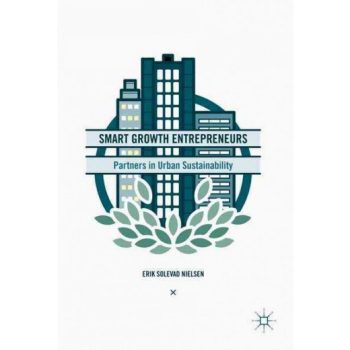Smart Growth Entrepreneurs: Partners in Urban Sustainability
by Erik Solevad Nielsen
This book examines smart growth entrepreneurs—innovators in government, development companies, architectural firms, and other organizations, who coalesce to shift policies and markets toward green planning and building practices. Cities across the world are trying to manage their population and economic growth by implementing the design principles of Smart Growth and New Urbanism, developing green buildings that are compact, mixed-use, and in close proximity to transit services. How do innovators, governments, and markets interact in this planning and development process? The book profiles smart growth entrepreneurs and their projects in both Southern California and the suburbs of Portland, Oregon. The author highlights the unique obstacles, political and economic, that these actors encounter and details the centrality of markets and regulations in sustainable urban development.
“This is a smart book about smart growth. Erik Nielsen does a superb job of demystifying the ‘new urbanism,’ providing a rich analysis of the underlying theories, illuminated by case studies of two regions that have sought to put theory into practice. Enthusiasts and skeptics alike will find this book an informative and rewarding insight into an important trend that is reshaping our cities.” (Richard Appelbaum, Research Professor and MacArthur Chair of the Global and International Studies Program at the University of California, Santa Barbara, USA)
“Nielsen thoughtfully examines an emerging group of professionals important in contemporary real estate development, providing specific evidence of the political and economic relevance of sustainability discourse and its ability to shape markets. This engagingly-written book locates these actors in their structural context, furthermore, revealing how their particular economic pursuits are constrained by the institutions they encounter. Scholars of urban and suburban development should take this book seriously, but so too should anyone interested in how cultural trends shape the political-economy of the built environment.” (Aaron Passell, Assistant Professor of Urban Studies, Barnard College, USA)

Smart Growth Entrepreneurs: Partners in Urban Sustainability
by Erik Solevad Nielsen
This book examines smart growth entrepreneurs—innovators in government, development companies, architectural firms, and other organizations, who coalesce to shift policies and markets toward green planning and building practices. Cities across the world are trying to manage their population and economic growth by implementing the design principles of Smart Growth and New Urbanism, developing green buildings that are compact, mixed-use, and in close proximity to transit services. How do innovators, governments, and markets interact in this planning and development process? The book profiles smart growth entrepreneurs and their projects in both Southern California and the suburbs of Portland, Oregon. The author highlights the unique obstacles, political and economic, that these actors encounter and details the centrality of markets and regulations in sustainable urban development.
“This is a smart book about smart growth. Erik Nielsen does a superb job of demystifying the ‘new urbanism,’ providing a rich analysis of the underlying theories, illuminated by case studies of two regions that have sought to put theory into practice. Enthusiasts and skeptics alike will find this book an informative and rewarding insight into an important trend that is reshaping our cities.” (Richard Appelbaum, Research Professor and MacArthur Chair of the Global and International Studies Program at the University of California, Santa Barbara, USA)
“Nielsen thoughtfully examines an emerging group of professionals important in contemporary real estate development, providing specific evidence of the political and economic relevance of sustainability discourse and its ability to shape markets. This engagingly-written book locates these actors in their structural context, furthermore, revealing how their particular economic pursuits are constrained by the institutions they encounter. Scholars of urban and suburban development should take this book seriously, but so too should anyone interested in how cultural trends shape the political-economy of the built environment.” (Aaron Passell, Assistant Professor of Urban Studies, Barnard College, USA)